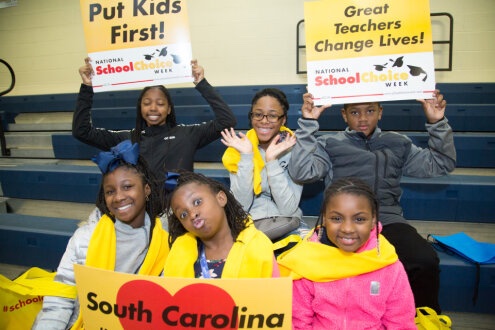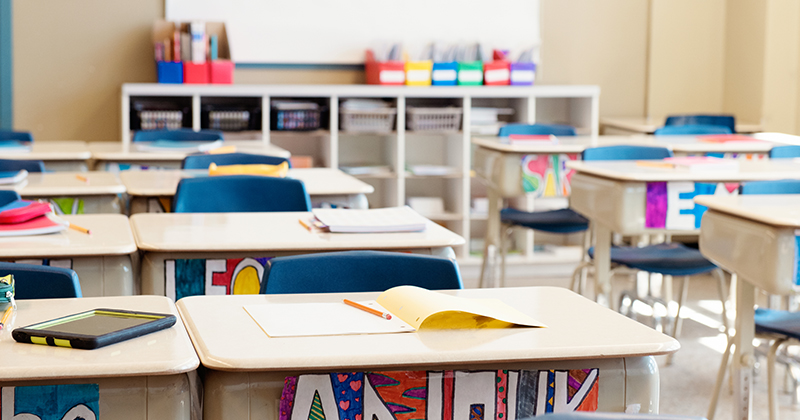Op-Ed: The Cares Act Creates an Opportunity for School Choice…But South Carolina’s public-education lobby is attempting to block need-based scholarships.
This op-ed originally appeared in the Wall Street Journal.
Elizabeth Reilly was preparing for a hard conversation with her children. She couldn’t afford to keep them in the private school they had always attended. The Reillys had worked hard and relied on family help to keep their two children—who each face learning challenges—in the school that met their needs. When Elizabeth’s husband, a Marine veteran, died earlier this year, she found herself in a tight spot: managing her own health, moving into a smaller home as she adjusted to a newer, smaller budget, and facing the reality that her kids would likely have to withdraw from the school they love.
Then she received an email from the principal. Gov. Henry McMaster had just announced Safe Access to Flexible Education (SAFE) Grants, a new initiative to meet the educational needs of working families like hers. A one-year, $32 million program funded by emergency Cares Act dollars, the grants would provide low- to moderate-income students in South Carolina with up to $6,500 to attend or remain in a private school of their choice. The news was the lifeline she needed.
But Ms. Reilly’s hope was dashed. South Carolina’s public-education lobby had secretly petitioned a judge to enjoin Mr. McMaster from continuing the SAFE Grant program. The plaintiffs, which include a school district and several taxpayers as well as the union-affiliated teachers associations, have tied up this urgent aid in a legal quagmire. Ms. Reilly and other parents await word on whether the South Carolina Supreme Court will take up the case and resolve it quickly, as she tries to plan for the rapidly approaching fall semester.
Despite the mountain of evidence from states like Florida that poor and minority children—in public and private schools—are the greatest beneficiaries of programs like SAFE Grants, school-choice efforts in South Carolina have consistently run into the brick wall of the state’s public-education lobby. Even many Republican lawmakers in this deep red state have hesitated to take on the union-allied education machine, especially in rural communities where the local school district may be the largest employer.
Decade after decade, thousands of talented and ambitious students have been consigned to failure by an antiquated system. The state’s bloated education establishment keeps offering the same excuse: “Education is underfunded.”
The argument falls apart when confronted with facts. South Carolina spends more than $10 billion annually on public education. That’s $14,383 per student, more than any other Southern state except Virginia and Louisiana. The opposition to modestly priced education-choice programs like SAFE Grants has nothing to do with what is best for students and everything to do with who will control that $10 billion: parents or central planners.
The plaintiffs, reaching for an ever-elusive definition of “equity,” conveniently fail to mention that their Orangeburg district, considered to be poor and rural, receives more than $16,000 per student. Where does all that money go? South Carolina’s high administrative spending mirrors well-documented national trends that have seen exponential growth in nonteaching staff and spending.
A 2018 survey of South Carolina’s private schools found average tuition and fees of less than $6,100. Hardly a caviar price, but still a significant sacrifice for moderate and low-income families.
In Aiken, S.C., the Rev. Doug Slaughter and his staff are preparing for Second Baptist Christian Prep’s fall semester. Founded 26 years ago on the legacy of African-American education activist and South Carolina native Mary McLeod Bethune, SBC Prep has provided some of Aiken’s poorest residents with the opportunity of a high-quality education.
Deeply shaped by his experience growing up in rural Virginia during the time of school integration, Mr. Slaughter, the school’s founder, speaks powerfully about SBC Prep’s mission. “If you can instill some hope in a person, no matter what they lack, or don’t have, or experience, it’s not going to be the end of their story,” he says. “This grant makes it possible for us to do what we love to do, and that is to give hope to young people.”
The pandemic has done enormous damage to the education of South Carolina students, as it has everywhere, but in a surprising way it has also created opportunity. This would be the first time the Palmetto State has offered students income-based financial help to attend a school other than the one they’re zoned for. People like Elizabeth Reilly and Doug Slaughter haven’t yet lost hope.
Ms. Weaver is president and CEO of Palmetto Promise Institute and co-defendant with Gov. Henry McMaster in the pending SAFE Grants litigation.





